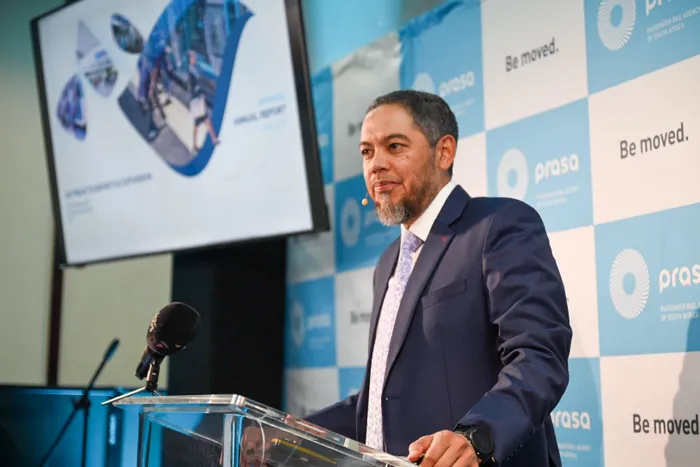Prasa edges closer to clean audit as internal controls, capital investment show results

PRASA GCEO, Hishaam Emeran, presented the 2024/25 Annual Performance Results on Wednesday — highlighting progress, achievements, and the journey towards a modern, reliable rail service for all South Africans.
Image: Supplied
Banele Ginindza
The Passenger Rail Agency of South Africa (Prasa) has said that it is on a firm path toward achieving a clean audit, following years of governance challenges and weak financial controls.
At the presentation of its 2024/25 financial year performance results on Wednesday, Prasa’s audit and risk committee chairperson Thinavhuyo Mpye said the entity had made significant strides in strengthening its audit environment, rebuilding trust with the Auditor-General of South Africa (AGSA), and tightening oversight across operations.
Mpye said the board’s audit and risk committee had tackled at least 17 irregular expenditure findings from a 1 200-page report, resulting in AGSA once again relying on the work of Prasa’s internal auditors — a milestone last achieved several years ago.
"Most importantly our relationship with the AGSA, which was no longer existent, was also restored. One of the important things we monitor is internal controls. The audit department is important. There was a time the AGSA did not rely on the Prasa's audit office. We needed to make sure that there are processes that need to be followed, we needed decapitate that department," Mpye said.
"At this point, AGSA is able to rely on the work of the internal auditor. It required rigorous oversight from the audit and risk committees."
Prasa's Group CEO, Hishaam Emeran, confirmed that the rail agency received an unqualified audit opinion from the Auditor-General.
"We are closing remaining audit findings, strengthening supply chain controls, and fully embedding consequence management systems to ensure sustainable governance standards that stand the test of time," said Emeran.
Despite progress on governance, Prasa's surplus fell to R3.1 billion, down from R10.5bn in the previous year, largely due to higher capital expenditure and reduced government subsidies.
Emeran said that capital investment was central to the recovery strategy, having deployed R21.1bn against an allocation of R11.6bn.
He said that the increased expenditure highlighted the urgent priority of fleet renewal, infrastructure recovery, and system modernisation as Prasa needs to be at 350 to 400 million passengers per year to break into the required level of sustainability.
"On buses, we have procured 17 buses but the requirement for the long distance bus service is 95 buses, over and above the 17. We have got plans to lease buses to take us to a fleet of 95. That is what we are dealing with with our shareholder in terms of getting to that point," he said.
"What we have done is secured 17, now we need approval to lease the additional to give us a fleet of 95 buses going forward."
Of the over 200 000 scheduled trips, Prasa saw a 91% on-time performance, with cancellations at just 3%. The group has also returned 35 of its 40 service lines to operation, with 70% now fully operational.
Although there has been a massive rise in customer numbers, there are still concerns across Prasa's financials.
Metrorail revenue of R396.6 million fell short of targets, although there was strong passenger volume growth. This was due to ticketing system gaps, delay-related refunds, increased season ticket adoption, and deferred fare adjustments.
BUSINESS REPORT